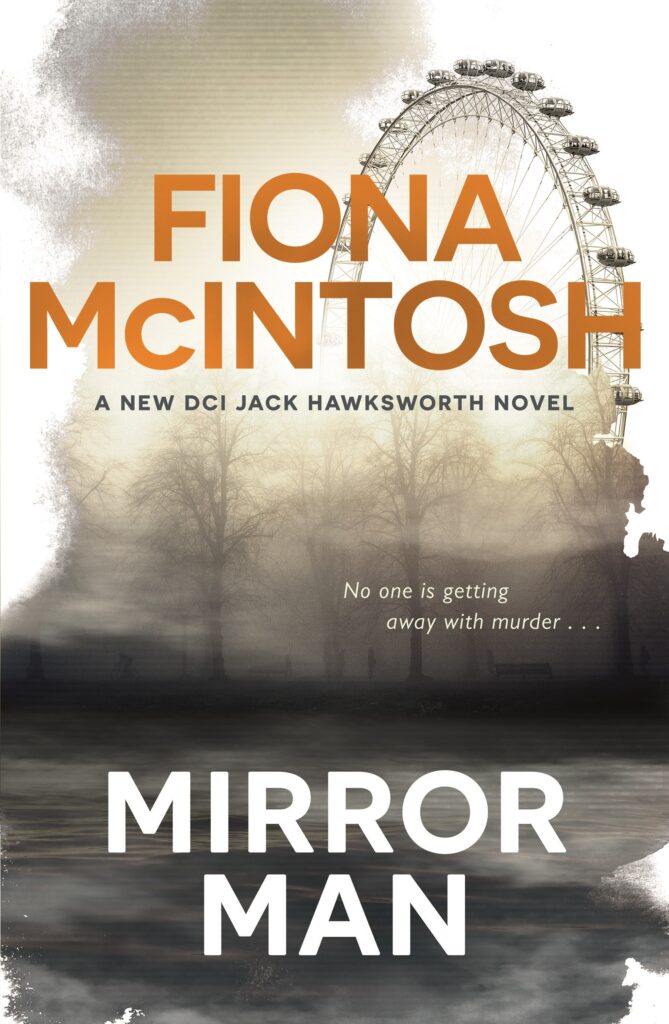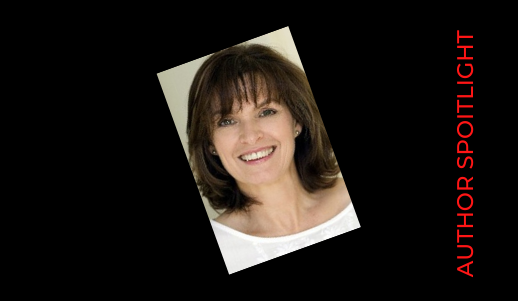Fiona McIntosh holds a mirror to UK law and sentencing as she discusses her new novel Mirror Man with Maggie Baron.
South Australian author Fiona McIntosh managed to swoop into London and complete the research for her latest novel Mirror Man (Michael Joseph|Penguin Random House, 2021) just before COVID 19 hit the world. She talks to Maggie Baron about her new Scotland Yard investigation, sentencing policies, and writing about violence.
Hi Fiona, congratulations on your new DCI Jack Hawksworth novel. From the get-go, I was drawn into this story and the complexity of issues you have broached.
You’re a South Australian, yet needed to bring London into detail for this plot. Early on you were able to travel and research on the ground, but when COVID-19 hit, you had to structure those elements remotely. What was the hardest aspect of writing that book away from London?
I’ve had very good training in researching novels through my work with historical fiction. I usually head into London for my starting point and so I committed several days and meeting times to a crime story I had nagging in the back of my mind. In 2019 I did a swoop into London specifically for Mirror Man to meet a retired Scotland Yard detective and was able to get back to him and Britain again in early 2020 just before the world shut down. I was so fortunate to have everything I needed in the vault for Mirror Man and I was able to disappear into my writing room and craft this story.
On the other side of the world, I had my policeman to badger with questions and I had my pal, a fellow writer, and historian who was also once part of the police who was able to research and provide any last-minute detail that I needed.

This book deals with complex social justice issues, sentencing policy, and practice. What are you hoping to bring to the reader in traversing this public policy area and what part of you came to the fore for Mirror Man?
This story potentially is an outlet for not just my dismay but perhaps a lot of people’s disappointment that sentences never seem to fully answer the horror we experience when a nasty crime has been committed.
Time and again we hear about trials and subsequent sentences that take into account so many aspects we are perhaps not privy to or understand and there’s a collective sense of rage that it feels like someone is getting off ‘lightly’. It’s human nature to want revenge but most of us are reasonable people who understand that an eye for an eye is rarely satisfying other than in a transient way.
Most of us accept that we need a system, that we need to find a way for criminals to pay their dues to society but also have the opportunity to achieve atonement and move on; to not simply rot away somewhere on the public purse. We all try hard to take the higher road in our thoughts because we perhaps believe a measure of our society is our ability to be reasonable, compassionate, to find understanding, etc.
Then there’s the debate about crowded jails, how the government has to find ways to alleviate the pressure of so many people locked up, the budget to look after those people who are incarcerated, the quality of those lives to try and work against a career criminal forming from a young age, whether locking up works, what other methods might be employed to deter people from re-offending.
And finally, the question of interpreting the law. What we want as a society in terms of justice is not always reflected in the precedent of law.
You’ve set a cracking pace for this story, drawing the reader into stark details about quite heinous crimes. How do you ensure you accurately portray those aspects?
I had excellent training in writing fantasy that at times can be horrific and violent, so coming up with the crimes wasn’t hard for me. Portraying them felt simple … I put myself into the shoes of the killer, not that I have a violent nature but I’m pretty adept at inhabiting different characters for my stories. You learn how walk inside their skin, think their thoughts.
For the most part, my villains are cunning and that’s what I enjoy exploring – as a writer it’s their smart minds and how they tick that intrigues me. I ask myself what they need to be aware of if they’re going to get away with murder … what plans they need to have in place, what physical aspects are involved, understanding how the police will proceed, etc. I find all of that twisty-turny pathway interesting to walk with the villain but, of course I always have a senior policeman reading behind me as I go to ensure authenticity of the era, the practices of the time, coaching me on how the police collectively think and act, what might happen behind the scenes at a certain stage, etc. When it comes to police procedure it’s vital to have that expertise on tap.
In your acknowledgements, you mention the concerted efforts of your readers to bring Jack back (after two previous novels). What were your considerations when thinking about his return and what did you most enjoy writing him again?
Yes, there was a gang, relentless in their endeavours, who never let me forget that they were impatiently awaiting book three. I wrote the first two crime novels almost as a dare but definitely as a distraction. What I discovered is that I loved writing them and that is probably because my first choice when it comes to reading fiction – and always has been – is crime thrillers.
It’s an evergreen genre that most people are prepared to read even if they might be diehard fantasy readers, or historical readers, etc. So, crime is something I devour whether I’m reading or streaming TV. And if you look at what we collectively stream most, it’s crime stories. We love the drama and intrigue. So, I knew there was always going to be a market for crime stories and I also knew I had unfinished business with Jack Hawksworth and one particular character who bobs up in the first two books to make his life difficult. Readers wanted closure on that character.
Given the enthusiasm for Mirror Man with the general audience and I do include men in this lovely audience, there is no doubt I’ll be writing more featuring Jack Hawksworth.
Can you tell us what you’re currently working on?
As I write this, I’m halfway through a big and final edit on The Spy’s Wife, which is the new historical novel for 2021 – the archetypal fish out of water story and set over a single year in Yorkshire, London, Paris and Munich during the mid-1930s. Love this era. Love this story.
While I edit, I am also writing the first draft of the historical novel for 2022 which is known as The Orphans. In a massive change up, due to COVID, I am writing my first all Australian story. I’m finding it extremely challenging but also rewarding to be researching the great outback and the development of South Australia in that era. It leans into two wildly different industries, both in massive development during the 1930s in this country.
While I edit and while I write, I am also busily researching two crime stories; one that will feature Jack Hawksworth, and another that I hope might bring a new character to storytelling, both set in Australia.
More info about Fiona McIntosh here.
